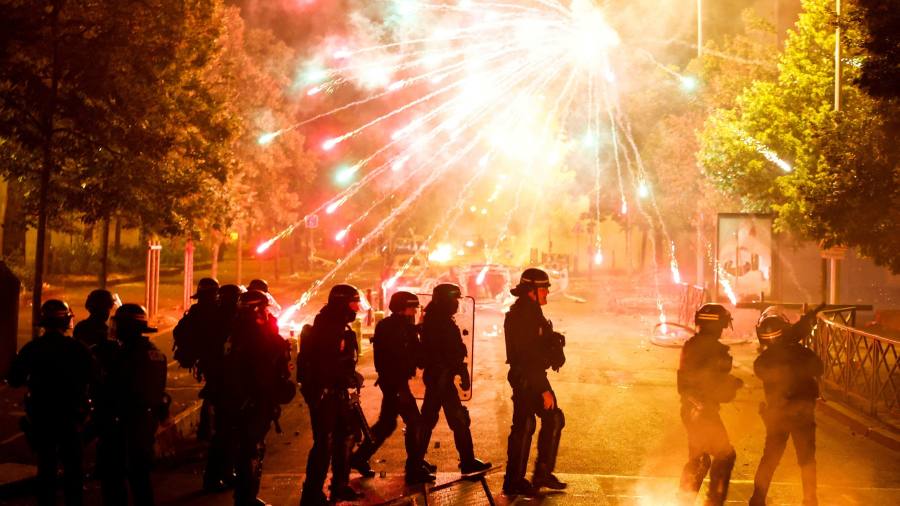
Receive free France updates
We’ll send you a myFT Daily Digest email rounding up the latest France news every morning.
France is cracking down on the illicit sale and transportation of fireworks, as authorities seek to limit access to explosives that have been used against police in recent riots sparked by the fatal shooting of a teenager.
The police have said they want to prevent criminal gangs based in low-income neighbourhoods where protests turned violent last week from replenishing their stocks of pyrotechnic materials. Several tonnes of fireworks have been seized in recent days in Paris and other parts of the country, according to the ministry of interior minister.
The government is also trying to ensure the July 14 national holiday celebrations are not marred by unrest, as has occurred in the past.
“I have heard the concerns expressed by residents and elected officials . . . and we are totally mobilised to ensure security on July 13 and 14,” said Prime Minister Élisabeth Borne while in northern France on Thursday.
Laws limit the use of so-called mortar fireworks, designed to set off large-scale displays, to licensed professionals. However, a black market has developed in recent years, as the cylinder-shaped devices have become a tool of choice for those who target police and firefighters during flare-ups of urban violence.
Mortar fireworks are often imported illegally from eastern Europe via similar illicit networks to those for drugs, according to French police. Anonymous sellers hawk them on social media and encrypted apps such as Telegram.
In the week of unrest after the police shooting of 17-year-old Nahel Merzouk at a traffic stop, protesters in the suburbs of Paris, Marseille and Lyon as well as the smaller northern town of Roubaix fired mortar fireworks at police officers and municipal buildings.
The mayor of Noisy-le-Sec, an eastern suburb of Paris, said he was targeted with fireworks “in an effort to intimidate” him, when he visited a low-income housing project on Tuesday, according to Agence France-Presse.
Interior minister Gérald Darmanin on Thursday instructed local and regional authorities to “limit the proliferation of these dangerous devices for law enforcement officers and our fellow citizens”.
Earlier in the crisis, he also met with social media groups such as Snapchat and TikTok to urge them to remove accounts selling illegal fireworks.
Darmanin said that customs agents seized almost 500kg of pyrotechnics destined for France during a traffic stop in Frankfurt on Tuesday. Border regions are on high alert for trafficked goods, with Doubs near Switzerland banning the sale and use of fireworks until July 11 and planning further “restrictive measures” on Bastille Day.
Bernard Deom, head of an association for fireworks businesses, said that more immediate controls “would have an impact” in the short term but that controlling illicit trade “is a bit like looking for a needle in a haystack”.
Rules governing fireworks were strong, he said, but lack of application meant there was “no traceability” of purchasers. “I’ll tell you the solution: there’s a law, we have to respect the law, that’s all,” Deom said.
Ahead of Bastille Day, police are publicising their efforts to strengthen compliance. The Parisian police department at Porte de Clignancourt publicised on Twitter the seizure of 300kg of fireworks marked with the logo of Jorge, a Polish company.
Contacted by the Financial Times, the company said it only sold to “registered entities with official permits” and that “we strongly oppose their use for other purposes”.
“We hope that the current situation will not affect the reputation of the pyrotechnics industry, which is, after all, part of the French national identity,” it added.